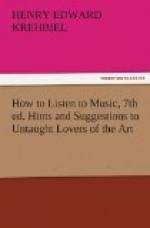[Sidenote: Decimation of the operatic list.]
[Sidenote: Dependence on singers.]
The composers who wrote operas for the generation that witnessed Adelina Patti’s debut at the Academy of Music, in New York, were Bellini, Donizetti, Verdi, and Meyerbeer. Thanks to his progressive genius, Verdi is still alive on the stage, though nine-tenths of the operas which made his fame and fortune have already sunk into oblivion; Meyerbeer, too, is still a more or less potent factor with his “Huguenots,” which, like “Lucia,” has endured from ten to twenty years longer than the average “immortal;” but the continued existence of Bellini and Donizetti seems to be as closely bound up with that of two or three singers as was Meleager’s life with the burning billet which his mother snatched from the flames. So far as the people of London and New York are concerned whether or not they shall hear Donizetti more, rests with Mesdames Patti and Melba, for Donizetti spells “Lucia;” Bellini pleads piteously in “Sonnambula,” but only Madame Nevada will play the mediator between him and our stiff-necked generation.
[Sidenote: An unstable art-form.]
[Sidenote: Carelessness of the public.]
[Sidenote: Addison’s criticism.]
[Sidenote: Indifference to the words.]
Opera is a mixed art-form and has ever been, and perhaps must ever be, in a state of flux, subject to the changes of taste in music, the drama, singing, acting, and even politics and morals; but in one particular the public has shown no change for a century and a half, and it is not quite clear why this has not given greater fixity to popular appreciation. The people of to-day are as blithely indifferent to the fact that their operas are all presented in a foreign tongue as they were two centuries ago in England. The influence of Wagner has done much to stimulate a serious attitude toward the lyric drama, but this is seldom found outside of the audiences in attendance on German representations. The devotees of the Latin exotic, whether it blend French or Italian (or both, as is the rule in New York and London) with its melodic perfume, enjoy the music and ignore the words with the same nonchalance that Addison made merry over. Addison proves to have been a poor prophet. The great-grandchildren of his contemporaries are not at all curious to know “why their forefathers used to sit together like an audience of foreigners in their own country, and to hear whole plays acted before them in a tongue which they did not understand.” What their great-grandparents did was also done by their grandparents and their parents, and may be done by their children, grandchildren, and great-grandchildren after them, unless Englishmen and Americans shall take to heart the lessons which Wagner essayed to teach his own people. For the present, though we have abolished many absurdities which grew out of a conception




